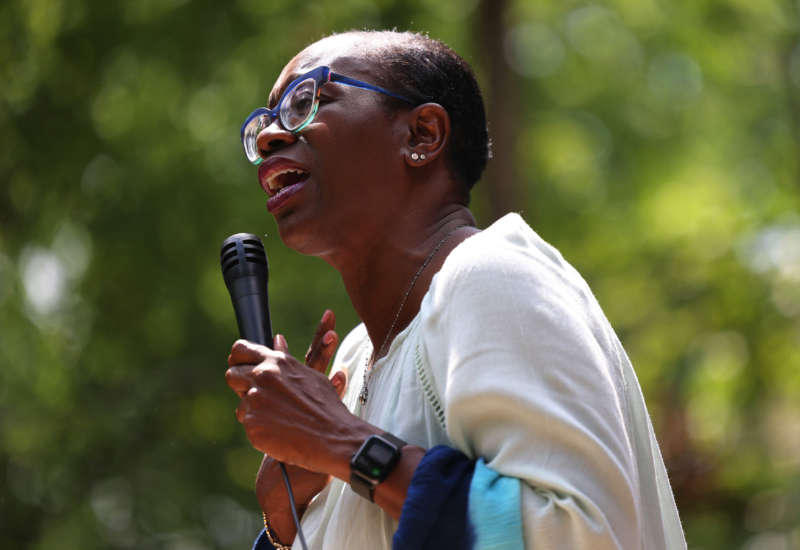Nina Turner has announced that she will be running to represent Cleveland in the House of Representatives after her campaign against Rep. Shontel Brown (D-Ohio) fell flat in the primaries last year.
Turner, who formerly served as an Ohio state senator and as campaign co-chair for Sen. Bernie Sanders (I-Vermont), will likely go up against Brown again. Brown beat Turner in a Democratic primary and easily won the general election to fill the seat vacated by Housing and Urban Development Secretary Marcia Fudge last year.
“Families are struggling…. While corporations make record profits,” Turner said in a video announcing her campaign. “Greater Cleveland needs a change maker, not someone who will just go along to get along. We can put an agenda through Congress that puts working families first.”
During last year’s run, Turner ran on a progressive platform that included supporting Medicare for All and a Green New Deal. She alluded to these priorities in her campaign announcement on Wednesday, saying that she would focus on climate, economic, racial and reproductive justice while in office.
“The people of Greater Cleveland overwhelmingly support Medicare for All. So do I,” she wrote on Twitter. “Healthcare has been denied to millions of Americans for too long. I will fight for Medicare for All, and I won’t take a dime from the health insurance industry.”
When she ran last year, Turner garnered endorsements from people like Rep. Alexandria Ocasio-Cortez (D-New York) and Sanders, along with the support of progressive groups like the Working Families Party.
In August, Brown won over Turner by about six points. Corporate media outlets framed the defeat as a public rejection of progressive ideology and as proof that President Joe Biden didn’t need to capitulate to the left. But progressives say that the takeaways from the election weren’t that simple.
As Turner noted at the time of her loss, Brown had the support of the massively powerful Democratic establishment, and received a flood of money from PACs, corporate funders and even GOP donors during the campaign; Turner called these donations “evil money” in her concession speech.
One of Brown’s major financial backers was a pro-Israel PAC called the Democratic Majority for Israel that spent over $2 million supporting Brown and running attack ads against Turner; other centrist and right-leaning organizations attempted to smear Turner by claiming that she isn’t a “real Democrat,” a common refrain of establishment Democrats targeting the left.
After the primary, some political commentators noted that the election didn’t indicate a widespread rejection of progressivism. What many news outlets overlooked at the time, wrote The Atlantic’s Elaine Godfrey, was that special elections are often not indicative of voters’ preferences more generally.
While a Turner win would have been a victory for the left, “Brown’s win indicates that the establishment was successful here, and that their late-in-the-game devotion of resources and manpower worked,” Godfrey wrote. “[T]hose are about the only reasonable extrapolations.”
“There was an anybody-but-Nina campaign ran in 2021,” Turner told NBC recently. “Some of those forces may still decide to get into this race, but what they will not be able to do is totally concentrate [on the Ohio 11th District] because this will not be the only race.”
Brown’s campaign last year touted her closeness with establishment Democrats. Her first TV ad bragged that she would “work with Joe Biden.”
As Cleveland.com’s Brent Larkin noted in May of last year, “Brown will be a well-financed candidate with deep-pocketed supporters who aren’t afraid to play rough. That’s because Turner can’t be beaten unless opponents plant seeds of doubt about her fitness, convincing voters her harsh criticisms of President Joe Biden would make it impossible for her to get things done for her community.” Larkin then pointed out that Biden chose Kamala Harris as his vice president despite her harsh criticisms of Biden during the primary.
Turner has said that it is important for progressive lawmakers to support Biden’s agenda while still demanding more from the party. “There is a need for people to both lift the president’s agenda when they agree with that agenda but also in that same motion push for more,” she told NBC. “I don’t see those things as mutually exclusive – even though people want to make it mutually exclusive.”


